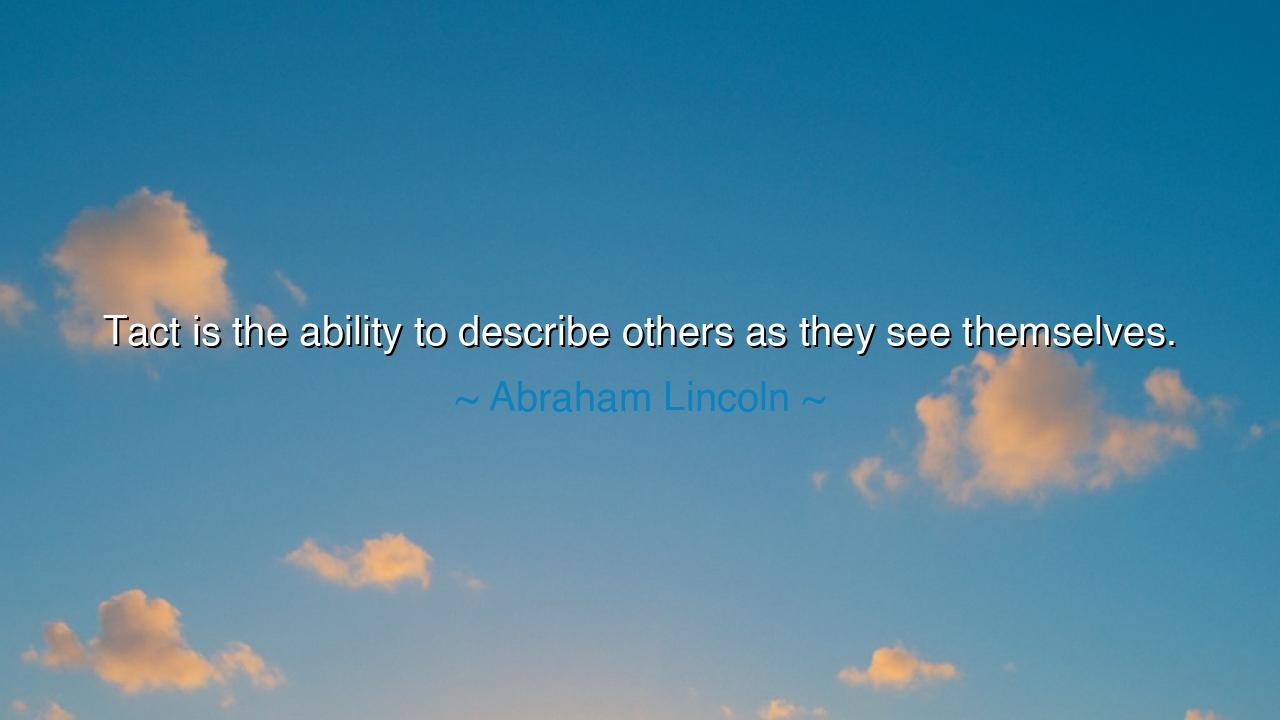
Tact is the ability to describe others as they see themselves.






“Tact is the ability to describe others as they see themselves.” Thus spoke Abraham Lincoln, the Great Emancipator — a man whose heart was as vast as his intellect, whose gentleness concealed unyielding strength. In these few words, Lincoln reveals a truth not only about diplomacy, but about the deep art of understanding the human soul. For what he calls tact is not mere politeness or flattery; it is the sacred ability to see the world through another’s eyes, to speak in a way that affirms their dignity without surrendering one’s truth. It is a wisdom born not of cleverness, but of compassion — the rare gift of meeting others where they are, and lifting them toward where they could be.
In the ancient days, the philosophers and sages spoke often of such understanding. The Greek philosopher Aristotle taught that rhetoric was not the art of manipulation, but of finding the right words to reach the heart of another. The wise in every age have known that a word, spoken with kindness and timing, has the power to calm tempests and move nations. Lincoln, who bore the burden of a divided land, mastered this art more than most. His tact was not weakness — it was strength guided by empathy. He could speak to the humble farmer and the proud general alike, not by deceiving them, but by recognizing their self-image, their sense of worth, and addressing that directly.
Lincoln’s life itself offers countless examples of this truth. When he appointed his former rivals — men like William Seward and Salmon Chase — to his cabinet, he did so not through force, but through understanding. These men, each ambitious and proud, had once sought the presidency themselves. Lincoln, instead of belittling them, spoke to them as equals, honoring their talents and respecting their pride. In doing so, he transformed enemies into allies, and competitors into comrades. His tact allowed him to build a government strong enough to preserve the Union, not by domination, but by understanding how others saw themselves.
There is a story of Lincoln meeting a Southern woman after the war, who spoke bitterly of the Union victory. Rather than chastise her, Lincoln replied gently, “Madam, I hope we are all better off for the struggle.” In that moment, he did not speak as a conqueror but as a reconciler — seeing her pain and reflecting it back with dignity. Such was the depth of his tact: to turn hostility into humility, not through argument, but through empathy. He knew that men and women cling fiercely to their sense of self, and that the surest way to guide them is not by wounding their pride, but by speaking to their own vision of who they wish to be.
This kind of tact, Lincoln teaches, is not mere diplomacy — it is a form of wisdom in action. It requires listening more than speaking, observing before judging. It demands that one’s words become mirrors, not hammers. The tactful person does not deceive; rather, they illuminate the best within others, even when those others cannot yet see it themselves. To describe someone as they see themselves is to acknowledge their humanity — to meet them not as a problem to solve, but as a person to understand. It is this humility that transforms conflict into cooperation, suspicion into trust, and division into dialogue.
And yet, this is no easy virtue. For to practice tact, one must lay aside pride, impatience, and the hunger to be right. It asks for restraint in a world that rewards boldness, and empathy in a world that prizes power. But Lincoln knew that true leadership — whether over a nation, a household, or one’s own heart — begins with this art. He understood that people do not follow truth until they first feel seen and respected. His greatness, then, was not only in his courage or intellect, but in his ability to unite strength with tenderness, conviction with grace.
So, O seeker of wisdom, take this teaching to heart. Speak not to conquer, but to connect. When you meet another, look beyond their words to the image they hold of themselves. Speak to that image — not with deceit, but with care. Praise what is noble, understand what is wounded, and address what is fearful with compassion. For in doing so, you will not only earn their ear — you will touch their soul.
Thus, remember Lincoln’s eternal lesson: tact is the bridge between truth and understanding. It is the art of honoring others without losing oneself, of turning words into instruments of peace rather than weapons of pride. To master it is to become not merely persuasive, but wise — a builder of harmony in a world forever divided by misunderstanding.






AAdministratorAdministrator
Welcome, honored guests. Please leave a comment, we will respond soon